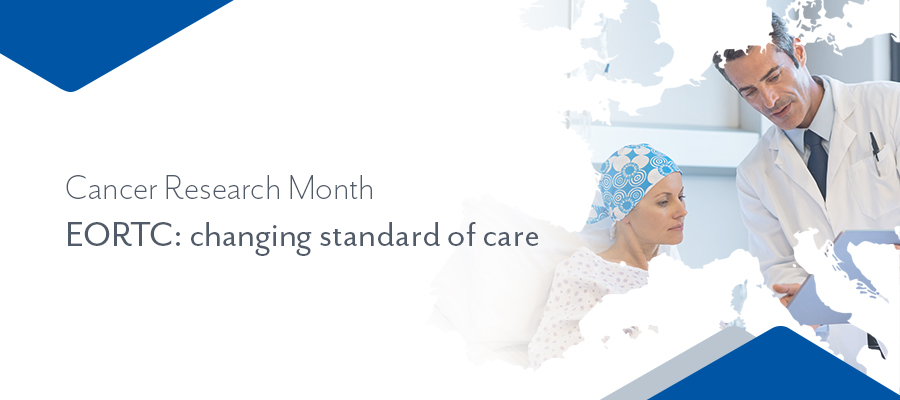EORTC: a leader in clinical cancer research
11 May 2018
EORTC has been a leader in clinical cancer research for more than 50 years. It has a network of 5500 collaborators throughout Europe and the world, engaging over 900 institutes to conduct large phase 2 or 3 trials.
EORTC is a multidisciplinary, international clinical research organisation conducting academic cancer clinical trials in all tumour types to optimize therapeutic strategies and answer unmet needs. It brings together all cancer disciplines and healthcare stakeholders to generate beneficial treatments to the patient. EORTC accelerates innovation by changing the paradigm for clinical cancer research, building infrastructures that reduce inefficiency producing effective cancer treatments. The organisation has the capacity to conduct large complex clinical trials especially in systemic therapy, radiation and surgical oncology, imaging, rare tumours and specific patient populations such older patients and young adults and adolescents.
Over the years the research conducted at EORTC have changed practice in many tumour types. In the era of expanding treatment, EORTC prides itself in conducting trials that reduce unnecessary treatment, helping to improve the quality of life and survival of a patient, establishing new standards of care and minimising healthcare costs. EORTC has data from over 190 000 patients and has the capacity to conduct long-term follow up studies, seeing how the treatment affects the patient over time.
An example of the clinical research that have changed the standard of care is the landmark studies done in breast cancer. One of the largest EORTC studies, (EORTC 10801), conducted in the 1980’s, compared mastectomy with breast conserving therapy in operable breast cancer. Results showed that there was no difference between local recurrences in breast cancer conserving therapy compared to mastectomies, however there was a clear benefit to quality of life of the patient. The 20-year follow-up of the EORTC 10801 trial, confirmed that breast conserving therapy could be offered as standard care to patients with early breast cancer; that is women with early disease could be treated without undergoing mastectomies. In recent studies, EORTC has contributed to improving lives of melanoma, brain tumours and sarcoma patients, producing breakthrough data in precision oncology and immunotherapy trials.
Increasing knowledge in understanding the cellular and molecular makeup of the cancer cells means more development in targeted therapies. Personalised medicine (precision oncology) has become a reality. In the last five years, there has been a departure from organ centric treatments to more specific anti-cancer drugs targeting alterations in the cancer genome, cellular receptors and proteins and immunotherapies.
The organisation has changed its scientific strategy to adapt to this changing environment. Many potential drugs go into clinical trials without appropriate understanding of the target biology thereby failing at a later stage consequently resulting in high rates of drug attrition. The classical phase I/II/III model for drug development has been used for more than four decades, where resources for clinical research programmes increase from phase I to phase III. Now, to accommodate the biology driven drug development, early clinical trials will have a more important role in defining new endpoints, based on functional imaging, tumour growth kinetics and validation of predictive markers. Large number of patients would be screened to accrue meaningful sized patient populations bearing the target of interest, selection of patients would be made on validated biomarkers resulting from quality assured infrastructures. EORTC established a screening platform known as SPECTA (Screening Cancer Patients for Efficient Clinical Trial Access) which is an integrated clinical research infrastructure that provides a quality-assured European infrastructure for collecting biological material from cancer patients. The goal of such a platform is to support pathology based translational research and biomarker discovery and ultimately to propose new therapeutic options for patients.
In this changing world, EORTC remains a leader in clinical cancer research, producing innovative solutions to improve the quality of life and survival of cancer patients.
Related News
Meet the new EORTC Board
9 Jul 2024
We are pleased to announce the release of the EORTC 2023 Annual Report
17 Jun 2024
Dr Denis Lacombe, EORTC CEO, appointed stakeholder co-chair of ACT EU advisory group
24 May 2024
Clinical Trials Day 2024: a Q&A on pragmatic clinical trials
20 May 2024
EORTC/EMA workshop suggests an international way forward for treatment optimisation studies
8 May 2024
EORTC’s Participation at the ESTRO Congress 2024
29 Apr 2024
EORTC: Advancing research and treatment for rare cancers
29 Feb 2024
EORTC Fellowship Programme: celebrating more than 20 years of impactful collaboration
22 Feb 2024
Appointment of Malte Peters as EORTC Strategic Alliance Officer
9 Feb 2024
Unique series of workshops in partnership with the European Medicines Agency (EMA)
7 Feb 2024


